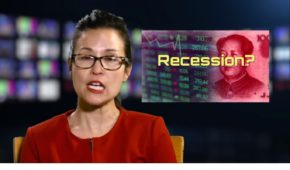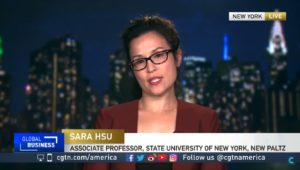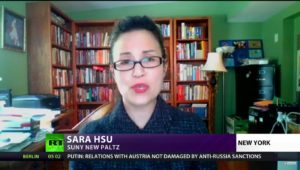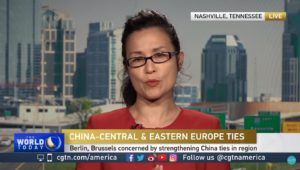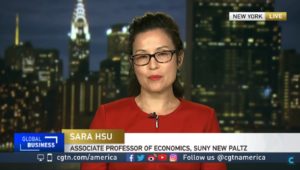 |
| Sara Hsu |
Rebuilding war-torn Syria might cost around US$250 billion and China raised its hand to participate.
Financial analyst Sara Hsu figures out what it behind that offer, while the rest of the world tries to steer clear from Syria,
for Triple Crisis. China sees some clear interests, she writes.
Sara Hsu:
China’s choice to fund Syrian reconstruction also appears to be economically motivated, in large part because Syria provides an important pathway along China’s Silk Road. On the ancient Silk Road, the city of Aleppo acted as a key market for buying and selling international goods, and the west coast of the country continues to provide access to the Mediterranean Sea. At present, Syria has the potential to be an important logistics hub. Not only that, but the construction of infrastructure itself will generate income for Chinese firms that have shown interest in taking part. This will aid Chinese firms, especially since the Asian nation is going through a period of slowing economic growth that has led to lower rates of infrastructure investment.
In addition, serious security will help ensure that Chinese investments in the region will remain intact. Some of these are located in Egypt, Iran, Turkey, and Saudi Arabia. The region is essential to Chinese investment in energy and infrastructure, and is viewed as an important crossroads between Asia and Europe. The security of this region can help to stabilize Xinjiang, home to Uighur separatists that China views as a threat to security and an important node on China’s new belt and road.
The U.S., Europe, and Gulf Arab allies are steering clear of funding reconstruction in Syria, as they believe that the wrong side won the Civil War. These nations have called for Assad’s departure as a precondition for receiving reconstruction aid, as they believe Assad is responsible for myriad atrocities carried out on his own people. The U.S. took the side of moderate Syrian rebels. For his part, Assad has stated he will reject aid from nations that supported the opposition during the war. Syria has received aid from Iran, Russia, and China, and will likely continue to do so.
Despite the opposition of the West against Assad, China’s decision to support the current Syrian government does not appear to be motivated by anti-Western sentiment or the desire to compete for influence with the United States. There are those who rally around the Chinese flag due to opposition to the United States, for sure, but these include less powerful nations, like Syria or Iran, that are politically and/or ideologically opposed to U.S. hegemony in the region and in the world.
In conclusion, China’s position of support for Assad’s Syria underscores its security and economic interests in the region. While any measure of support for a particular regime may be viewed as political, China is attempting to refrain from engaging in directly political activities in the country and in the Middle Eastern region. China’s aim is to make economic gains through One Belt One Road, employing its own firms in the construction of much-needed infrastructure, and attempting to ensure security in order to do so. While the West may dislike China’s support of the Assad regime, China’s involvement in the reconstruction process is likely to bolster its role in the Middle East and strengthen its global soft power going forward.
More at Triple Crisis.
Sara Hsu is a speaker at the China Speakers Bureau. Do you need her at
your meeting or conference? Do get in touch or fill in our speakers' request form.
Are you looking for more experts on China's One Belt, One Road program? Do check out this list.
